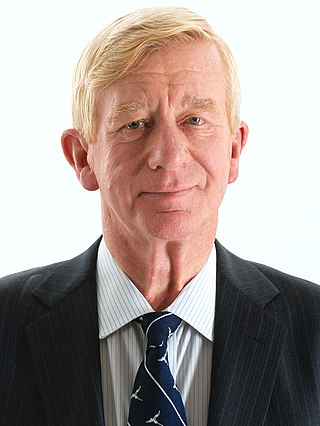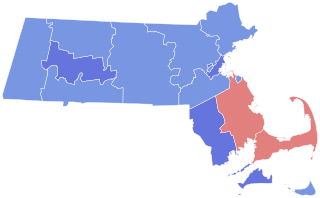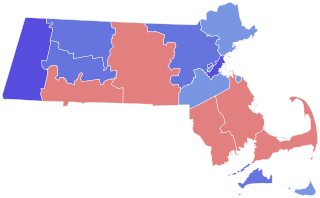
The 2004 United States Senate elections were held on November 2, 2004, with all Class 3 Senate seats being contested. They coincided with the re-election of George W. Bush as president and the United States House elections, as well as many state and local elections. Senators who were elected in 1998, known as Senate Class 3, were seeking re-election or retiring in 2004.

William Floyd Weld is an American attorney, businessman, author, and politician who served as the 68th Governor of Massachusetts from 1991 to 1997. A Harvard and Oxford graduate, Weld began his career as legal counsel to the United States House Committee on the Judiciary before becoming the United States Attorney for the District of Massachusetts and later, the United States Assistant Attorney General for the Criminal Division. He worked on a series of high-profile public corruption cases and later resigned in protest of an ethics scandal and associated investigations into Attorney General Edwin Meese.

The Conservative Party of New York State is an American political party founded in 1962 following conservative dissatisfaction with the Republican Party in New York. Running on the Conservative Party line, James L. Buckley won election to the U.S. Senate in 1970 and served for one term. Since 2010, the party has held "Row C" on New York ballots—the third-place ballot position, directly below the Democratic and Republican parties—because it received the third-highest number of votes of any political party in the 2010, 2014 and 2018 New York gubernatorial elections. The party is known for its strategy of attempting to influence the Republican Party in a more conservative direction.

The 1996 United States Senate elections were held on November 5, with the 33 seats of Class 2 contested in regular elections. Special elections were also held to fill vacancies. They coincided with the presidential election of the same year, in which Democrat Bill Clinton was re-elected president.

The 1988 United States Senate elections were elections for the United States Senate. Held on November 8, the 33 seats of Class 1 were contested in regular elections. In spite of the Republican victory by George H. W. Bush in the presidential election, the Democrats gained a net of one seat in the Senate. Seven seats changed parties, with four incumbents being defeated. The Democratic majority in the Senate increased by one to 55–to–45.

The 1984 United States Senate elections were held on November 6, with the 33 seats of Class 2 contested in regular elections. They coincided with the landslide re-election of President Ronald Reagan in the presidential election. In spite of the lopsided presidential race, Reagan's Republican Party suffered a net loss of two Senate seats to the Democrats, although it retained control of the Senate with a reduced 53–47 majority. Democrats defeated incumbents in Illinois and Iowa, and won an open seat in Tennessee, while Republicans defeated an incumbent in Kentucky.

The 1980 United States Senate elections were held on November 4, coinciding with Ronald Reagan's victory in the presidential election. The 34 Senate seats of Class 3 were contested in regular elections. Reagan's large margin of victory over incumbent Jimmy Carter gave a huge boost to Republican Senate candidates, allowing them to flip 12 Democratic seats and win control of the chamber for the first time since the end of the 83rd Congress in January 1955.

The 1976 United States Senate elections was an election for the United States Senate. Held on November 2, the 33 seats of Class 1 were contested in regular elections. They coincided with Democrat Jimmy Carter's presidential election and the United States Bicentennial celebration. Although almost half of the seats decided in this election changed parties, Carter's narrow victory did not provide coattails for the Democratic Party. Each party flipped seven Senate seats, although, one of the seats flipped by Democrats was previously held by a Conservative.

The 2010 United States Senate elections were held on November 2, 2010, from among the United States Senate's 100 seats. A special election was held on January 19, 2010, for a mid-term vacancy in Massachusetts. Thirty-four of the November elections were for six-year terms to the Senate's Class 3, while other three were special elections to finish incomplete terms. Those 37 November elections featured 19 incumbent Democrats and 18 incumbent Republicans.

The 1970 United States Senate elections was an election for the United States Senate. It took place on November 3, with the 33 seats of Class 1 contested in regular elections. Special elections were also held to fill vacancies. These races occurred in the middle of Richard Nixon's first term as president. The Democrats lost a net of three seats, while the Republicans and the Conservative Party of New York picked up one net seat each, and former Democrat Harry F. Byrd Jr. was re-elected as an independent.

The 1964 United States Senate elections were held on November 3. The 33 seats of Class 1 were contested in regular elections. Special elections were also held to fill vacancies. They coincided with the election of President Lyndon B. Johnson by an overwhelming majority, to a full term. His Democratic Party picked up a net two seats from the Republicans. As of 2023, this was the last time either party has had a two-thirds majority in the Senate, which allowed the Senate Democrats to override a veto, propose constitutional amendments, or convict and expel certain officials without any votes from Senate Republicans. However, internal divisions would have prevented the Democrats from having done so. The Senate election cycle coincided with Democratic gains in the House in the same year.

The Kansas Republican Party is the state affiliate political party in Kansas of the United States Republican Party. The Kansas Republican Party was organized in May 1859.

The 1990 Massachusetts gubernatorial election was held on November 6, 1990. Incumbent Democratic Governor Michael Dukakis, his party's nominee for president in 1988, opted to not seek a fourth term. Republican Bill Weld won the open seat, beating Democrat John Silber to become the first Republican Governor of Massachusetts elected since 1970. This election was the first open-seat gubernatorial election in Massachusetts since 1960.

The 1984 United States Senate election in Massachusetts was held on November 6, to elect a member of the U.S. Senate from the State of Massachusetts. The election was won by Democrat John Kerry, the Lieutenant Governor of Massachusetts, who remained Senator until 2013, when he resigned to become United States Secretary of State. One-term incumbent Democratic Senator Paul Tsongas declined to seek re-election after developing cancer.

The 2012 United States Senate elections were held on November 6, 2012, with 33 of the 100 seats in the Senate, all Class 1 seats, being contested in regular elections whose winners would serve six-year terms beginning January 3, 2013, with the 113th Congress. Democrats had 21 seats up for election, plus 1 Independent and 1 Independent Democrat, while the Republicans had only 10 seats up for election. The presidential election, elections to the House of Representatives, elections for governors in 14 states and territories, and many state and local elections were also held on the same day.

The 2008 United States Senate election in Massachusetts took place on November 4, 2008. Incumbent Democratic U.S. Senator John Kerry, who remained in the Senate after losing the presidency to incumbent President George W. Bush in the 2004 presidential election, won re-election to a fifth term in office. Four years into his term, Kerry resigned upon becoming United States Secretary of State in the Barack Obama administration.
The Delaware Democratic Party (DelDems) is the affiliate of the Democratic Party in the U.S. state of Delaware. It is headquartered in New Castle County and chaired by Erik Raser-Schramm.

Elections in the U.S. state of New Hampshire are held at national, state and local level. The state holds the first presidential primary in the national cycle. Elections for a range of state positions coincide with biennial elections for the House of Representatives.

The 2014 United States Senate elections were held on November 4, 2014. A total of 36 seats in the 100-member U.S. Senate were contested. Thirty-three Class 2 seats were contested for regular six-year terms to be served from January 3, 2015, to January 3, 2021, and three Class 3 seats were contested in special elections due to Senate vacancies. The elections marked 100 years of direct elections of U.S. senators. Going into the elections, 21 of the contested seats were held by the Democratic Party, while 15 were held by the Republican Party.

The 2013 United States Senate special election in Massachusetts was held on June 25, 2013, in order to fill the Massachusetts Class 2 United States Senate seat for the remainder of the term ending January 3, 2015.























